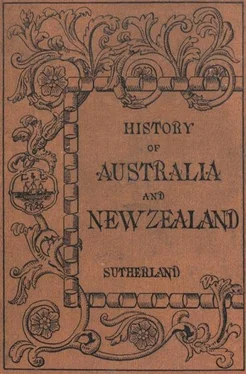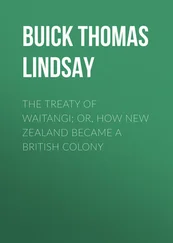Brahe had remained a month and a half longer than he had been told to wait; and as his own provisions were fast diminishing, and there seemed, as yet, to be no signs of Wright with the remainder of the expedition, he thought it unsafe to delay his return any longer. This man Wright was the cause of all the disasters that ensued. Instead of following closely on Burke, he had loitered at Menindie for no less than three months and one week, amusing himself with his friends; and, when he did set out, he took things so leisurely that Brahe was half-way back to the Darling before they met.
3. Sufferings.—On the evening when they entered the depôt, Burke, Wills, and King made a hearty supper; then, for a couple of days, they stretched their stiff and weary limbs at rest. But inaction was dangerous, for, even with the greatest expedition, their provisions would only serve to take them safely to the Darling. They now began to deliberate as to their future course. Burke wished to go to Adelaide, because, at Mount Hopeless—where Eyre had been forced to turn back in 1840—there was now a large sheep station, and he thought it could not be more than 150 miles away. Wills was strongly averse to this proposal. “It is true,” he said, “Menindie is 350 miles away, but then we know the road, and are sure of water all the way.” But Burke was not to be persuaded, and they set out for Mount Hopeless. Following Cooper’s Creek for many miles, they entered a region of frightful barrenness. Here, as one of the camels became too weak to go farther, they were forced to kill it and to dry its flesh. Still they followed the creek, till at last it spread itself into marshy thickets and was lost; they then made a halt, and found they had scarcely any provisions left, while their clothes were rotten and falling to pieces. Their only chance was to reach Mount Hopeless speedily; they shot their last camel, and, whilst Burke and King were drying its flesh, Wills struck out to find Mount Hopeless; but no one knew which way to look for it, and Wills, after laboriously traversing the dry and barren wastes in all directions, came back unsuccessful. A short rest was taken, and then the whole party turned southward, determined this time to reach the mount. But they were too weak to travel fast; day after day over these dreary plains, and still no sign of a hill; till at length, when they were within fifty miles of Mount Hopeless, they gave in. Had they only gone but a little farther, they would have seen the summit of the mountain rising upon the horizon; but just at this point they lost hope and turned to go back. After a weary journey, they once more reached the fresh water and the grassy banks of Cooper’s Creek, but now with provisions for only a day or two. They sat down to consider their position, and Burke said he had heard that the natives of Cooper’s Creek lived chiefly on the seed of a plant which they called nardoo; so that, if they could only find a native tribe, they might, perhaps, learn to find sufficient subsistence from the soil around them. Accordingly, Burke and King set out to seek a native encampment; and, having found one, they were kindly received by the blacks, who very willingly showed them how to gather the little black seeds from a kind of grass which grows close to the ground.
With this information they returned to Wills; and, as the nardoo seed was abundant, they began at once to gather it; but they found that, through want of skill, they could scarcely obtain enough for two meals a day by working from morning till night; and, when evening came, they had to clean, roast, and grind it; and, besides this, whatever it might have been to the blacks, to them it was by no means nutritious—it made them sick, and gave them no strength.
Whilst they were thus dwelling on the lower part of Cooper’s Creek, several miles away from the depôt, Brahe had returned to find them and bring them relief. On his way home he had met with Wright leisurely coming up, and had hastened back with him to the depôt; but when they reached it they saw no signs of Burke and Wills, although the unfortunate explorers had been there only a few days before. Brahe, therefore, concluded that they were dead, and once more set out for home. Meanwhile Burke thought it possible that a relief party might in this way have reached the creek, and Wills volunteered to go to the depôt to see if any one was there. He set out by himself, and after journeying three or four days reached the place; but only to find it still and deserted. He examined it carefully, but could see no trace of its having been recently visited; there could be no advantage in remaining, and he turned back to share the doom of his companions. He now began to endure fearful pangs from hunger. One evening he entered an encampment that had just been abandoned by the natives, and around the fire there were some fish bones, which he greedily picked. Next day he saw two small fish floating dead upon a pool, and they made a delicious feast; but, in spite of these stray morsels, he was rapidly sinking from hunger, when suddenly he was met by a native tribe. The black men were exceedingly kind; one carried his bundle for him, another supported his feeble frame, and gently they led the gaunt and emaciated white man to their camp. They made him sit down and gave him a little food. Whilst he was eating he saw a great quantity of fish on the fire. For a few minutes he wondered if all these could possibly be for him, till at length they were cooked and the plentiful repast was placed before him. The natives then gathered round and clapped their hands with delight when they saw him eat heartily. He stayed with them for four days, and then set out to bring his friends to enjoy likewise this simple hospitality. It took him some days to reach the place where he had left them; but when they heard his good news they lost no time in seeking their native benefactors. Yet, on account of their weakness, they travelled very slowly, and when they reached the encampment it was deserted. They had no idea whither the natives had gone. They struggled a short distance farther; their feebleness overcame them, and they were forced to sink down in despair. All day they toiled hard to prepare nardoo seed; but their small strength could not provide enough to support them. Once or twice they shot a crow, but such slight repasts served only to prolong their sufferings. Wills, throughout all his journeyings, had kept a diary, but now the entries became very short; in the struggle for life there was no time for such duties, and the grim fight with starvation required all their strength.
At this time Wills records that he cannot understand why his legs are so weak; he has bathed them in the stream, but finds them no better, and he can hardly crawl out of the hut. His next entry is, that unless relief comes shortly he cannot last more than a fortnight. After this his mind seems to have begun to wander; he makes frequent and unusual blunders in his diary. The last words he wrote were that he was waiting, like Mr. Micawber, for something to turn up, and that, though starving on nardoo seed was by no means unpleasant, yet he would prefer to have a little fat and sugar mixed with it.
4. Death of Burke and Wills.—Burke now thought that their only chance was to find the blacks, and proposed that he and King should set out for that purpose. They were very loath to leave Wills, but, under the circumstances, no other course was possible. They laid him softly within the hut, and placed at his head enough of nardoo to last him for eight days. Wills asked Burke to take his watch, and a letter he had written for his father; the two men pressed his hands, smoothed his couch tenderly for the last time, and set out. There, in the utter silence of the wilderness, the dying man lay for a day or two: no ear heard his last sigh, but his end was as gentle as his life had been free from reproach.
Читать дальше












